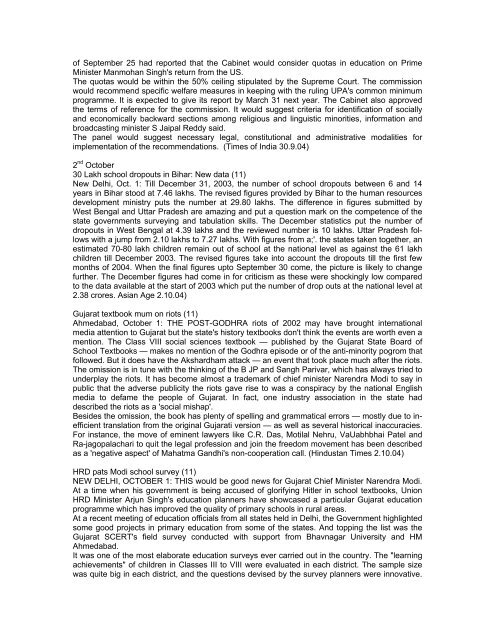EDUCATION - 2004 - Indian Social Institute
EDUCATION - 2004 - Indian Social Institute
EDUCATION - 2004 - Indian Social Institute
You also want an ePaper? Increase the reach of your titles
YUMPU automatically turns print PDFs into web optimized ePapers that Google loves.
of September 25 had reported that the Cabinet would consider quotas in education on Prime<br />
Minister Manmohan Singh's return from the US.<br />
The quotas would be within the 50% ceiling stipulated by the Supreme Court. The commission<br />
would recommend specific welfare measures in keeping with the ruling UPA's common minimum<br />
programme. It is expected to give its report by March 31 next year. The Cabinet also approved<br />
the terms of reference for the commission. It would suggest criteria for identification of socially<br />
and economically backward sections among religious and linguistic minorities, information and<br />
broadcasting minister S Jaipal Reddy said.<br />
The panel would suggest necessary legal, constitutional and administrative modalities for<br />
implementation of the recommendations. (Times of India 30.9.04)<br />
2 nd October<br />
30 Lakh school dropouts in Bihar: New data (11)<br />
New Delhi, Oct. 1: Till December 31, 2003, the number of school dropouts between 6 and 14<br />
years in Bihar stood at 7.46 lakhs. The revised figures provided by Bihar to the human resources<br />
development ministry puts the number at 29.80 lakhs. The difference in figures submitted by<br />
West Bengal and Uttar Pradesh are amazing and put a question mark on the competence of the<br />
state governments surveying and tabulation skills. The December statistics put the number of<br />
dropouts in West Bengal at 4.39 lakhs and the reviewed number is 10 lakhs. Uttar Pradesh follows<br />
with a jump from 2.10 lakhs to 7.27 lakhs. With figures from a;'. the states taken together, an<br />
estimated 70-80 lakh children remain out of school at the national level as against the 61 lakh<br />
children till December 2003. The revised figures take into account the dropouts till the first few<br />
months of <strong>2004</strong>. When the final figures upto September 30 come, the picture is likely to change<br />
further. The December figures had come in for criticism as these were shockingly low compared<br />
to the data available at the start of 2003 which put the number of drop outs at the national level at<br />
2.38 crores. Asian Age 2.10.04)<br />
Gujarat textbook mum on riots (11)<br />
Ahmedabad, October 1: THE POST-GODHRA riots of 2002 may have brought international<br />
media attention to Gujarat but the state's history textbooks don't think the events are worth even a<br />
mention. The Class VIII social sciences textbook — published by the Gujarat State Board of<br />
School Textbooks — makes no mention of the Godhra episode or of the anti-minority pogrom that<br />
followed. But it does have the Akshardham attack — an event that took place much after the riots.<br />
The omission is in tune with the thinking of the B JP and Sangh Parivar, which has always tried to<br />
underplay the riots. It has become almost a trademark of chief minister Narendra Modi to say in<br />
public that the adverse publicity the riots gave rise to was a conspiracy by the national English<br />
media to defame the people of Gujarat. In fact, one industry association in the state had<br />
described the riots as a 'social mishap'.<br />
Besides the omission, the book has plenty of spelling and grammatical errors — mostly due to inefficient<br />
translation from the original Gujarati version — as well as several historical inaccuracies.<br />
For instance, the move of eminent lawyers like C.R. Das, Motilal Nehru, VaUabhbhai Patel and<br />
Ra-jagopalachari to quit the legal profession and join the freedom movement has been described<br />
as a 'negative aspect' of Mahatma Gandhi's non-cooperation call. (Hindustan Times 2.10.04)<br />
HRD pats Modi school survey (11)<br />
NEW DELHI, OCTOBER 1: THIS would be good news for Gujarat Chief Minister Narendra Modi.<br />
At a time when his government is being accused of glorifying Hitler in school textbooks, Union<br />
HRD Minister Arjun Singh's education planners have showcased a particular Gujarat education<br />
programme which has improved the quality of primary schools in rural areas.<br />
At a recent meeting of education officials from all states held in Delhi, the Government highlighted<br />
some good projects in primary education from some of the states. And topping the list was the<br />
Gujarat SCERT's field survey conducted with support from Bhavnagar University and HM<br />
Ahmedabad.<br />
It was one of the most elaborate education surveys ever carried out in the country. The "learning<br />
achievements" of children in Classes III to VIII were evaluated in each district. The sample size<br />
was quite big in each district, and the questions devised by the survey planners were innovative.

















